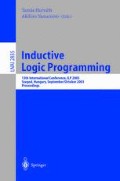Abstract
Induction of the effects of actions considered here consists in learning an action description of a dynamic system from evidence on its behavior. General logic-based induction methods can deal with this problem but, unfortunately, most of the solutions provided have the frame problem. To cope with the frame problem induction under suitable nonmonotonic formalisms has to be used, though this kind of induction is not well understood yet. We propose an alternative method that relies on the identification of a monotonic induction problem whose solutions correspond one-to-one to those of the original problem without the frame problem. From this result induction of the effects of actions can be characterized under current monotonic induction methods.
Access this chapter
Tax calculation will be finalised at checkout
Purchases are for personal use only
Preview
Unable to display preview. Download preview PDF.
References
Otero, R.: Induction of stable models. In: Rouveirol, C., Sebag, M. (eds.) ILP 2001. LNCS (LNAI), vol. 2157, pp. 193–205. Springer, Heidelberg (2001)
Muggleton, S., Feng, C.: Efficient induction of logic programs. Inductive Logic Programming (1992)
Kietz, J.: Some lower bounds on the computational complexity of inductive logic programming. In: Brazdil, P.B. (ed.) ECML 1993. LNCS (LNAI), vol. 667, pp. 115–123. Springer, Heidelberg (1993)
Moyle, S., Muggleton, S.: Learning programs in the event calculus. In: Džeroski, S., Lavrač, N. (eds.) ILP 1997. LNCS (LNAI), vol. 1297, pp. 205–212. Springer, Heidelberg (1997)
Moyle, S.: Using theory completion to learn a robot navigation control program. In: Matwin, S., Sammut, C. (eds.) ILP 2002. LNCS (LNAI), vol. 2583, pp. 182–197. Springer, Heidelberg (2003)
Sakama, C.: Inverse entailment in nonmonotonic logic programs. In: Cussens, J., Frisch, A.M. (eds.) ILP 2000. LNCS (LNAI), vol. 1866, pp. 209–224. Springer, Heidelberg (2000)
Lorenzo, D., Otero, R.: Learning to reason about actions. In: Proc. of the 14th European Conference on Artificial Intelligence, ECAI 2000, pp. 316–320 (2000)
Author information
Authors and Affiliations
Editor information
Editors and Affiliations
Rights and permissions
Copyright information
© 2003 Springer-Verlag Berlin Heidelberg
About this paper
Cite this paper
Otero, R.P. (2003). Induction of the Effects of Actions by Monotonic Methods. In: Horváth, T., Yamamoto, A. (eds) Inductive Logic Programming. ILP 2003. Lecture Notes in Computer Science(), vol 2835. Springer, Berlin, Heidelberg. https://doi.org/10.1007/978-3-540-39917-9_20
Download citation
DOI: https://doi.org/10.1007/978-3-540-39917-9_20
Publisher Name: Springer, Berlin, Heidelberg
Print ISBN: 978-3-540-20144-1
Online ISBN: 978-3-540-39917-9
eBook Packages: Springer Book Archive

